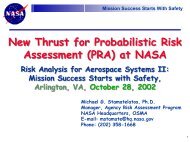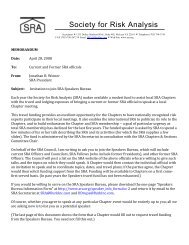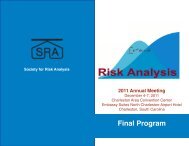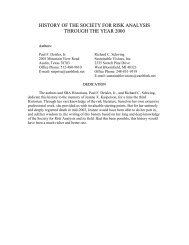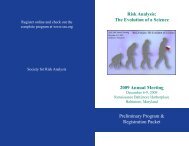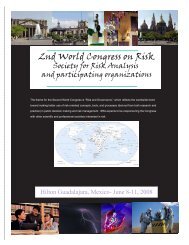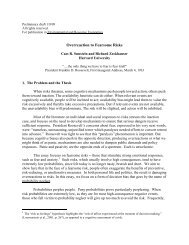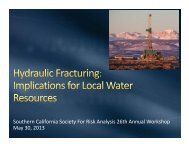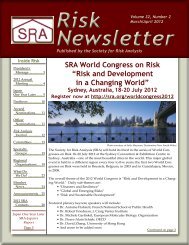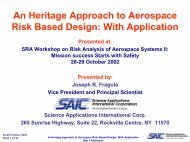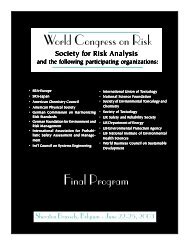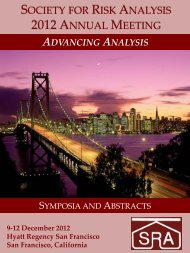Abstracts (PDF file, 1.8MB) - Society for Risk Analysis
Abstracts (PDF file, 1.8MB) - Society for Risk Analysis
Abstracts (PDF file, 1.8MB) - Society for Risk Analysis
You also want an ePaper? Increase the reach of your titles
YUMPU automatically turns print PDFs into web optimized ePapers that Google loves.
SRA 2013 Annual Meeting <strong>Abstracts</strong><br />
W3-J.1 Baxter, J.*; Robinson, L.; Metz, D.; Bolthrunis, S.;<br />
Industrial Economics Inc. (Baxter, Metz, and Bolthrunis);<br />
Havard School of Public Health (Robinson);<br />
jbaxter@indecon.com<br />
Quantitative Adjustments Addressing Under-reporting of<br />
Baseline <strong>Risk</strong>s Associated With Recreational Boating<br />
Using National Health Care Databases<br />
The United States Coast Guard requires a reliable range of<br />
estimates on the number of fatalities and injuries that result<br />
from recreational boating accidents, and on the monetary value<br />
of these fatalities and injuries as well as property damages. It<br />
currently collects these data in the Boating Accident Report<br />
Database (BARD) system, and uses this in<strong>for</strong>mation to guide<br />
boating safety policy and regulation. We present the results of<br />
an analysis quantifying the extent to which BARD may<br />
under-report fatalities and injuries using well-established<br />
national databases of deaths, hospitalizations, emergency<br />
department visits, and doctor’s office visits. Our results suggest<br />
BARD may under count less severe injuries by more than two<br />
orders of magnitude. We also evaluate the importance of these<br />
missing data to policy development, considering the relative<br />
values of reducing injury risks of varying levels of severity.<br />
T4-D.1 Beaudrie, CB*; Kandlikar, M; Long, G; Gregory, R;<br />
Wilson, T; Satterfield, T; Compass Resource Management Ltd.;<br />
cbeaudrie@compassrm.com<br />
Nanotechnology <strong>Risk</strong> Screening using a Structured<br />
Decision Making (SDM) Approach<br />
The responsible development of new nanomaterials and<br />
nano-enabled products requires that potential risks are<br />
understood and managed be<strong>for</strong>e harmful implications occur.<br />
Nonetheless, quantitative and predictive tools <strong>for</strong> anticipating<br />
risk are still in their early stages of development. Until such<br />
assessment tools are available, there is a clear need <strong>for</strong> a<br />
robust screening methodology to in<strong>for</strong>m nanomaterial risk<br />
management decision-making in regulatory agencies and<br />
industry. This paper presents the results of a two-day workshop<br />
of nanotechnology experts aimed at building an expert<br />
judgment-based risk screening framework <strong>for</strong> emerging<br />
nanomaterials. Drawing upon expertise in nanotoxicology,<br />
human exposure, and environmental fate and transport,<br />
participants developed an adaptive framework relating key<br />
nanomaterial physicochemical characteristics to important<br />
hazard and exposure indicators. This framework provides the<br />
foundation <strong>for</strong> development of an open-sourced tool to aid in<br />
risk screening and identifying opportunities to re-engineer<br />
products to minimize risk.<br />
M3-B.4 Beck, NB; American Chemistry Council;<br />
nancy_Beck@americanchemistry.com<br />
Discussion: Pulling the Pieces Together<br />
This part of the program (the last talk of the double session)<br />
will be a discussion and questions-and-answers session to more<br />
fully tie the seven previous talks together and to explore the<br />
similarities/differences and benefits of each of the approaches<br />
that have been discussed.<br />
T2-B.4 becker, RA*; Olden, K; becker, richard; Author 1)<br />
Becker (American Chemistry Council); Author 2) Olden (US<br />
Environmental Protection Agency);<br />
rick_becker@americanchemistry.com<br />
Progress Made in Improving IRIS: A Panel Discussion<br />
Presenters and additional experts, drawn from EPA, academia,<br />
non-governmental organizations and industry, will participate<br />
in a discussion that will include audience question and answers.<br />
Discussion will include perspectives on changes that have<br />
already been made, plans EPA has announced <strong>for</strong> making<br />
further changes and areas where additional improvements<br />
would strengthen IRIS.<br />
December 8-11, 2013 - Baltimore, MD



